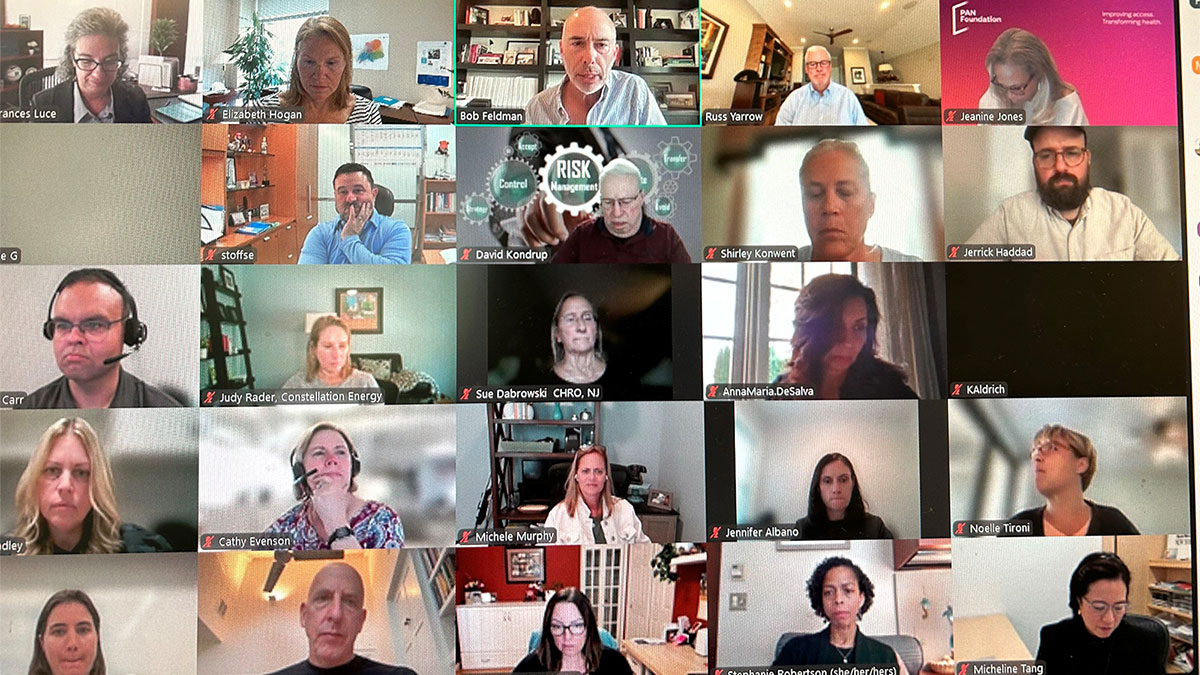The Civility Call
The Civility Call provides a vital forum for senior HR and communications leaders to share best practices on managing workplace tensions during polarized times. Convened in partnership with SHRM and the Page Society, these monthly discussions provide expert insights and best practices from participants organizations. Each month, executives engage in candid dialogue after expert-led discussions on pressing topics like navigating political discourse, customer relationships across divides, and supporting employee wellbeing. This open sharing of strategies and experiences is critical, as businesses face escalating civility risks that can disrupt operations and damage reputations amid the intensifying 2024 election cycle.
As businesses brace for potential workplace tensions surrounding the upcoming presidential election, more than 150 senior HR and communications executives gathered virtually for the October session of Duke University’s Dialogue Project to workshop strategies through an innovative case study approach.
“With just two weeks until election day, we wanted to create an engaging way for leaders to think through how they would handle various scenarios that might emerge in their organizations,” said Bob Feldman, founder of the Dialogue Project at Duke’s Fuqua School of Business.
The session centered on a fictional case about Linda Johnson, head of communications and human resources at the manufacturing company Warburton, which faces mounting workplace civility challenges as election day approaches. Through live polling and dynamic discussion, participants debated key decision points Linda encounters, from the timing of interventions to whether the CEO should make public statements.
Act Now or Wait?
When polled about whether there was still time to implement meaningful initiatives two weeks before election day, the majority of participants advocated for immediate action, even with limited time.
“You have to address the issue that is at hand now,” noted one senior HR executive. “Between now and the election, things are not going to change unless we take some action to calm the waters in the workplace.”
Several participants shared how their own organizations are already implementing pre-election guidance. “About two weeks ago we had our CEO send something out discouraging political conversations while acknowledging they happen, emphasizing the need for respect,” explained one HR leader.
However, Feldman noted that timing decisions should account for company culture and leadership readiness: “If you feel the leadership is not prepared to initiate these conversations or reinforce certain guidelines, sometimes you create more risk by getting out in front of where the organization is culturally.”
Public Statements: A Complex Calculus
The group was more divided on whether companies should issue public statements about civility, with 62% supporting CEO statements and 38% opposed. JB Lyon, co-founder of the Civic Business Initiative at the Harvard Negotiation Project, advised that companies consider acting collectively rather than alone.
“In general, if one company comes out alone, it could leave you in a vulnerable spot,” Lyon said. “It’s often stronger and smarter for companies to come together and make joint statements, or rely on associations.”
Anna Maria DeSalva, global chairman of the consulting firm Burson, emphasized that CEOs’ primary constituency is their employees. She noted that well-crafted internal communications can effectively serve dual purposes, as important internal messages often become external ones in today’s social media environment.
Implementation Insights
When evaluating Linda’s three-part “Civility Initiative” – including guidelines, a hotline, and CEO video – participants stressed the importance of building buy-in before launch.
“It felt like too much doing without really engaging and listening,” observed one senior communications executive. “Making the CEO vulnerable without true buy-in from the leadership team and employee groups creates risk.”
Others recommended piloting programs with small groups first, ensuring frontline leaders are equipped to facilitate discussions, and leveraging existing reporting channels rather than creating special hotlines that might encourage complaints.
Looking Ahead
The session concluded with scenario planning for post-election challenges, with Mike Ward of the Civic Business Initiative noting that “November 5th shouldn’t be viewed as an end date – in some respects, it could be a start date” for workplace tensions.
To illustrate constructive dialogue across differences, Feldman shared an acclaimed 2020 campaign video featuring Utah gubernatorial candidates from opposing parties (Spencer Cox and Chris Peterson) modeling civil discourse – suggesting companies might identify respected internal leaders who could similarly demonstrate respectful disagreement.
Mary Frances Luce, Fuqua’s new dean, opened the session by noting how the strong participation reflects the urgency of addressing workplace polarization: “A polarized society means a polarized workforce. Every company seems to be confronting these challenges.”
The Dialogue Project’s next call on November 18th will allow participants to share experiences and lessons learned from the immediate post-election period. The initiative continues to serve as a vital forum for senior leaders to workshop solutions to workplace civility challenges in real-time.
“Today’s interactive format enabled peer learning at its best,” said Feldman. “The insights came not from outside experts, but from experienced leaders actively working to maintain productive, positive workplaces during a potentially volatile time.”
The session’s case study and key takeaways are available on the Dialogue Project website, along with resources from partner organizations like the Civic Business Initiative and new research on workplace polarization from Burson.

